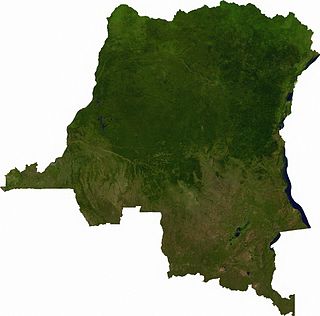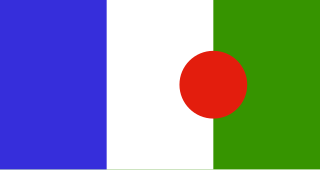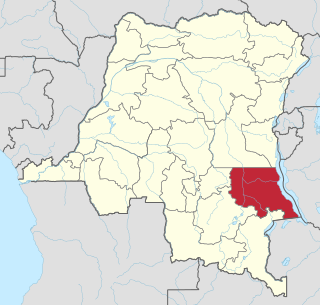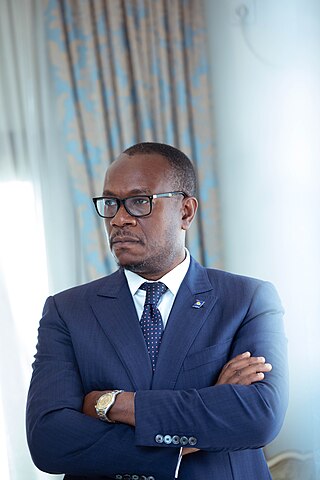Related Research Articles

The Third Republic of the Democratic Republic of the Congo is a unitary state with a five-level hierarchy of types of administrative division. There are nine different types of country subdivision in a new hierarchy with no new types but with two from the previous one abolished.

Articles related to the Democratic Republic of the Congo include:

The Twa are a group of indigenous Central African foragers tribes. These cultural groups were formerly called Pygmies by European writers,but the term is no longer preferred based on its cultural and geographic inaccuracy,as well as being seen as pejorative. Cultural groups are being reclassified by themselves based on their function in society,lineage,and land ties.

The Great Lakes Twa,also known as Batwa,Abatwa or Ge-Sera,are a Bantu ethnic group native to the African Great Lakes region on the border of Central and East Africa. As an indigenous pygmy people,the Twa are generally assumed to be the oldest surviving population of the Great Lakes region. Current populations of Great Lakes Twa people live in the states of Rwanda,Burundi,Uganda and the eastern portion of the Democratic Republic of Congo. In 2000 they numbered approximately 80,000 people,making them a significant minority group in these countries. The largest population of Twa is located in Burundi estimated in 2008 at 78,071 people.

Bunyakiri is a town located in the high plateau of Kalehe Territory in the South Kivu Province in the eastern region of the Democratic Republic of the Congo (DRC). Bunyakiri is nearby the Bulehe and Mulamba villages. It is mainly inhabited by Tembo,Havu,Twa and Hunde ethnic groups.

Luvungi,also known as Itara-Luvungi,is one of the groupements (groupings) within the Bafuliiru Chiefdom in the Uvira Territory of the South Kivu Province in the eastern Democratic Republic of the Congo (DRC). Situated on the Ruzizi Plain,it lies at the borders of Uvira Territory and Walungu Territory,in close proximity to the frontiers of Rwanda and Burundi. Luvungi is home to a population of approximately 85,000 individuals,predominantly consisting of Fuliru agriculturalists who play a vital role in the local community. There's also has a small population of Vira,Bembe,Lega,Shi,Burundians and Banyamulenge. Its economy is founded mainly on subsistence agriculture and the artisanal mining of cassiterite,an ore of tin.

Michèle Taïna Audette is a Canadian politician and activist. She served as president of Femmes autochtones du Québec from 1998 to 2004 and again from 2010 to 2012. She was also the president of Native Women's Association of Canada from 2012 to 2014. From 2004 through 2008,she served as Associate Deputy Minister at the Ministry of Relations with Citizens and Immigration of the Quebec government,where she was in charge of the Secretariat for Women.

The Batwa–Luba clashes were a series of clashes in the Democratic Republic of the Congo (DRC) between the Pygmy Batwa people,and the Luba people that began in 2013 and ended in 2018.
Solange Lwashiga Furaha is a human and women's rights activist from the Democratic Republic of the Congo,and the executive secretary of the South Kivu Congolese Women's Caucus for Peace.

Ève Bazaiba Masudi is a Congolese lawyer,politician,and human rights activist. As of May 2019,she served as the Secretary General of the Movement for the Liberation of the Congo (MLC) political party. She is Deputy Prime Minister and Minister for the Environment since 2021.
The Kipupu massacre occurred on 16 July 2020 in the South Kivu village of Kipupu in the Mwenga Territory in the eastern Democratic Republic of the Congo. Gunmen belonging to the Ngumino and Twiganeho militias of the Banyamulenge community attacked the village and reportedly killed 220 people according to provincial lawmakers,while independent analysts state only 18 people were killed.
The Fifty Percent Women or Nothing Dynamic is a campaigning group based in South Kivu,uniting several civil society women's organizations in the Democratic Republic of the Congo. The group calls for full implementation of Article 14 of the Constitution,which guarantees gender parity in the management of public affairs at national,provincial and local level.

General elections were held in the Democratic Republic of the Congo on 20 December 2023. Combined elections were held for the President,484 of the 500 members of the National Assembly,700 of the 716 elected members of the 26 provincial assemblies,and for the first time under the new constitution,951 members of a scaled down number of commune (municipal) councils. On election day,the Congolese government extended voting to 21 December for polling stations that had not opened on 20 December. Agence France-Presse reported that some polling stations would open as late as 24 December.

Lulenge is one of the four sectors of Fizi Territory of the South Kivu Province in the eastern region of the Democratic Republic of the Congo (DRC). It is situated near the Kiloba and Makena villages,at an altitude of 943 meters. Its capital is Kilembwe. Lulenge is bordered to the north by the Itombwe sector and Mwenga Territory. In the east,it is bordered by Lake Tanganyika and the Mutambala sector. In the south,it is bordered by the N'gangya sector,and in the west by Shabunda Territory.
The cities of the Democratic Republic of the Congo are administrative divisions of provinces with the exception of Kinshasa which itself has the status of a province. Cities are further divided into communes. They are led by mayors except for Kinshasa which is led by a governor.
Bibogobogo,also known as Bibokoboko in Kibembe,is a village in the middle plateaus of the Mutambala Sector in the Fizi Territory in the South Kivu Province of the Democratic Republic of the Congo (DRC). It is situated in the forested mountains and middle plateaus,overlooking Baraka in the south-west,near Kisombe and Bibokoboko II villages. Bibogobogo shares the borders with Uvira Territory in the North,the Mwenga Territory and Shabunda Territory in the West,the Kalemie Territory in the South,and Lake Tanganyika in the East. Geologically,the regional soil is composed of metals,including sodium,potassium,calcium,magnesium,iron,aluminium and mercury,making it suitable for gold plating,mercury pollution,pollution index and agriculture.

The Lemera massacre,also known as the Lemera Attack or Lemera Battle,which occurred on October 6,1996,was a massacre perpetrated by the Alliance of Democratic Forces for the Liberation of Congo (AFDL) at Lemera Hospital,a medical facility in the small town of Lemera,about 85 kilometers northwest of Uvira in the South Kivu Province of the Democratic Republic of the Congo (DRC). 37 individuals were killed,according to the United Nations Mapping Report.
DieudonnéBolengetenge Balea is a Congolese politician who represented Isangi Territory,Tshopo Province in the National Assembly from 2006 to 2023. He also served as Minister of Land Affairs from December 8,2014,to September 25,2015,and is currently serving as secretary-general of Together for the Republic.

Delly Sesanga Hipungu Dja Kaseng Kapitu is a Congolese lawyer and deputy in the National Assembly representing Luiza Territory. He was a candidate in the 2023 Democratic Republic of the Congo general election,but withdrew in favor of Moïse Katumbi. He is also the head of political party Envoi de la RDC.
Louise Munga Mesozi is a Congolese politician. She was Minister of Posts,Telephones and Telecommunications in the Muzito government from October 2008 to 2012,then Minister of the Portfolio from 2012 to 2015 in the Matata government.
References
- 1 2 "Adolphine Byayuwa Muley EDD". talatala.cd. Talatala. Retrieved 19 November 2023.
- 1 2 3 Berwouts, Kris. "Pygmy women leader and environmental activist appointed minister in South Kivu". mo.be. Mondial Nieuws. Retrieved 19 November 2023.
- ↑ Biodiversität und Klimawandel: Botschaften indigener Frauen (PDF) (Report). Institut für Ökologie und Aktions-Ethnologie. 2011. p. 26.
- ↑ Cultural Survival, Cultural Survival. "Merciless Plight for African 'Pygmies'". culturalsurvival.org. Cultural Survival. Retrieved 19 November 2023.
- ↑ Kanga, Esther. "SUD-KIVU : Un espoir se dessine pour les femmes autochtones aux élections de 2023". deboutrdc.net. Debout RDC. Retrieved 19 November 2023.
- ↑ Mwamba, Justin. "Législatives nationales : le Sud-Kivu passe de 4 femmes en 2018 à une seule femme en 2023". actualite.cd. Actualite. Retrieved 26 March 2024.